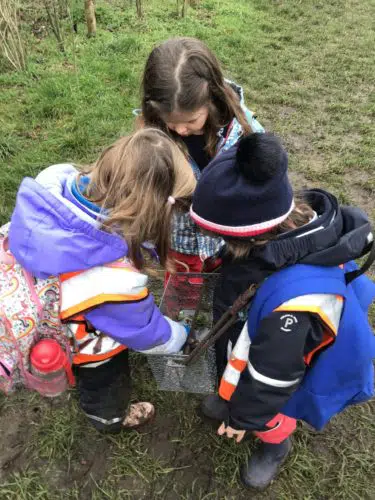The past year has seen a shift in the way that we live our everyday lives – we’ve gone from office chats to zoom calls, working out in the gym to watching Joe Wicks in our living rooms, and dining out to creating our very own sourdough bread. Some changes have been for the better, giving us more time to spend together whilst we navigate the multiple “new normals” we are facing. However, something that has struggled has been the education sector, and more specifically how children have been learning via online sessions when schools have been closed. 67% of schools feeling unprepared for the sudden shift into online classes (LLAKES, 2020), and 60% of primary school parents struggling to support their child’s learning at home (IFS, 2020). It’s important to find other ways to help grow our children’ development, keep them engaged, and motivated to pursue their learning beyond the current immediate task. Outdoor forest schools have been a saving grace in that respect this year – giving children the opportunity to develop and learn in a safe environment whilst still being able to socialise during a global pandemic.
Social Skills
Nature and outdoor forest schools are now renowned for helping develop social skills that will benefit children in their futures. According to a report published last year by McKinsey & Company, the demand for higher cognitive skills such as empathy, critical thinking and collaboration will grow through “2030 at cumulative double-digit rates.” Outdoor, child-led play also gives children the opportunity to develop accountability. At Wild about Play, we encourage pre-school and after-school children to have autonomy over what activities they partake in and what they can do to ensure they are utilizing their time with us well. That can vary from creating stick puppets to put on a collective show for the practitioners or scaling our compost mountain as a team to reach the dizzying summit together. “Learning by doing” (Loughborough University, 2017) in the outdoors stimulates brain activity and helps contribute to collaborative learning skills. Researcher Tassoni states that “children tend to concentrate and persevere for long periods when they are ‘in control of their learning. Their levels of motivation are higher because they have chosen something that appeals to them” (2007). Without even knowing it they strengthened the very social skills that are vital to their development whilst having fun as a unit. This socialisation has never been more important than after a year in lockdown with limited opportunities to interact with their peers.
Mental Health Benefits
It is no secret that being able to learn and play outdoors is a form of escapism for children who spend most of the day in a classroom and now, indoors learning at home. The stress that our curriculum places on their young shoulders can sometimes get too much. This is due to the amount of pressure to understand and retain large quantities of information, particularly as they get older. The past year has exacerbated this by forcing children to learn on small laptops or tablets at home in unmotivated situations. Outdoor forest schools allow children to appreciate time in nature, breathe fresh air and use their imagination to unknowingly implement the lessons they have learned indoors. This gives children the opportunity to take a step back and enjoy themselves. A 2016/17 study carried out at Sheffield Hallam University concluded that life satisfaction and happiness are higher for physically active people, and their levels of anxiety are lower. “We now have conclusive evidence that physical activity is linked to mental wellbeing” (Lisa O’Keefe, Sport England, 2017). In addition, studies across the UK have also shown that even 5 minutes of exercise and play in an outdoor environment can rapidly improve self-esteem, mental health and wellbeing in young people.
Immune System Benefits
Whilst most colds and other illnesses are prominent in the winter, it is a common misconception that it is the cold air outside that harbours these viruses. The recycled air in closed, indoor spaces is what causes and spreads most illnesses. At outdoor forest schools, children can breathe fresh air and thus reduces the spread of infection. In addition, being outside and exercising gives your child’s immune system a huge boost. By being exposed to natural germs, the body can build up protection – and it is widely known that physical activity gives your immune system a power surge for the next 24 hours, resulting in a reduction in illnesses and less use of antibiotics. At Wild about Play, we have worked hard to ensure that the new parameters we are operating under do not impede or infringe on the children’s learning and enjoyment. Spending time outdoors during a global pandemic has meant that children get that immune system boost whilst still being safe and engaged.
While many families struggled with the timetable for online education, wouldn’t it be worthwhile and forward-thinking if the Government reviewed the past years’ outcomes so children can do longer motivated project work that could be done in the outdoors? Is it also a time to assess how we learn so that we are better able to meet the creative demands of our future job market? We believe the answer to both of these questions is a resounding yes.







